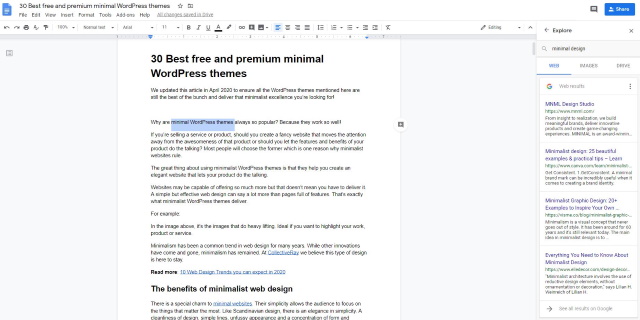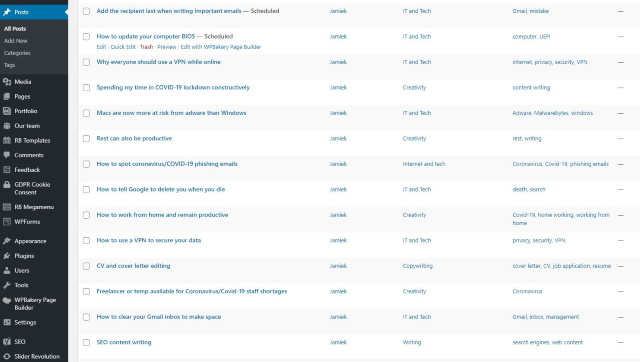CV and cover letter editing

You don’t need me to tell you it’s tough out there if you’re looking for work. There is a lot of competition, good roles are hard to come by and you have to make a lot more effort than ever before to secure a job. All that will be for nothing if your CV and cover letter aren’t up to scratch.
There are three common errors that occur more than they should in CVs and cover letters. All three infuriate recruiters and will likely get your application rejected out of hand. Unless you are an absolute perfect fit in every other way or possess skills nobody else does, your application is wasted.
My sister spent years as a recruitment consultant and would instantly delete any application that had basic errors. I’m sure the other thousands of recruiters would do exactly the same thing.
Those errors are:
- Basic spelling and grammar
- Mixed tenses
- Buzzwords and meaningless terms
Let’s take a look at each of these.
Basic spelling and grammar
Basic spelling and grammar errors within a CV or cover letter really are inexcusable. Every office suite or document editor has a spellcheck function. Most will also have a grammar checker. Use them.
I have a very simple process in writing. Whether it’s a CV, cover letter or the content I write for Coastal Content. It goes something like this:
- Read the brief very carefully.
- Research the subject.
- Write the first draft.
- Leave overnight.
- Edit the draft and leave overnight again.
- Edit again.
- Publish or send to the client.
It’s a very straightforward process. Reading the brief carefully means you fully understand what is expected of you. In the case of a job application, that means reading the job description, requirements, nice-to-haves and any supporting information. Then research the employer, get to know their character and the type of language they use.
Write the first draft of your CV with your research in mind. If you’re putting together a generic CV, research the industry rather than specific employer. Once written, save your work and leave it overnight. Trust me on this. Patience will be worth it.
Next day or whenever you’re ready, open the CV and read it again. Notice how many errors you made? How many you’re picking up after leaving the work for a while? Make any changes necessary, save and leave again.
Pick it up another time and edit again. Still seeing errors? Correct them and finish the CV. If you’re confident you caught everything, don’t be. Edit it again. If in doubt, ask someone to check it over before you send.
You can send your CV and covering letter to Coastal Content if you like. I’ll check everything over and make sure they are the best they can be.
Mixed tenses
Mixed tenses are hard to spot. They are another simple error that many people can miss because they can be very subtle. Yet many recruiters will pick it up and dismiss your application because of them.
Mixed tenses are where you get your past and present tense mixed up. The rule is, your current role should be present tense. ‘Exceeding ROI targets for clients’, ‘Rolling out system upgrades across an international IT estate’ and so on.
Previous roles should always be in past tense. ‘Exceeded ROI targets for clients’, ‘Rolled out system upgrades across an international IT estate’ and so on.
As you can see, the difference is subtle but critical. Missing it shows lack of care and effort. Even if you spent many hours on a CV or covering letter and genuinely missed them or didn’t know the difference, it is perceived by recruiters as lack of care.
Buzzwords and meaningless terms
Some industries are guilty of having more buzzwords than others. This is especially true in corporate life. Terms such as ‘problem solving skills’, ‘knowledge of the product lifecycle’, ‘adept at blue sky thinking’ and other pointless terms have all come up on CVs and cover letters we have edited.
Don’t use them. CVs have to be quantifiable and demonstrate your ability to do the job. If the job description mentions product lifecycles, use the term but expand on it. ‘Development a strong knowledge of the product lifecycle from prototyping, user testing, measuring feedback and refining designs and future iterations’. You get the idea.
Meaningless terms are almost universally disliked by anyone outside your industry. You wouldn’t use ‘thinking outside the box’ or ‘take it to the next level’ in any sensible adult conversation outside the office so why would you use it in a CV or cover letter? You would be amazed at the number of people who do!
If you’re planning to apply for a job and aren’t sure about the quality of your CV or cover letter, Coastal Content can help. Our experienced editor can check for all three of these errors and offer suggestions on how to improve your work. All for £20!
That’s a small price to pay to stand a higher chance of getting that job don’t you think?



